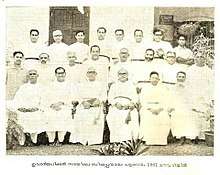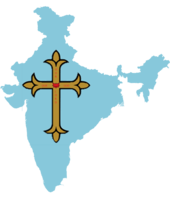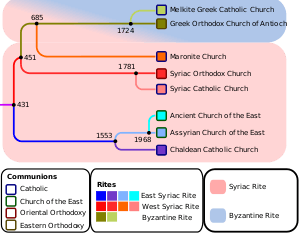St. Thomas Evangelical Church of India
St. Thomas Evangelical Church of India (STECI) is an evangelical, episcopal denomination based in Kerala, India. It derives from a schism in the Malankara Mar Thoma Syrian Church in 1961, and traces its ancestry before then back almost 2,000 years. STECI holds that the Bible is the inspired, inerrant and infallible Word of God. Adherents believe that all that is necessary for salvation and living in righteousness is given in the Bible. The church is engaged in active evangelism. The headquarters of this church is at Tiruvalla, a town in the state of Kerala which is in the Southwestern part of South India.
| St. Thomas Evangelical Church of India | |
|---|---|
 St Thomas Evangelical Church Of India Emblem | |
| Type | Protestant Eastern Christian |
| Classification | Syrian Christian |
| Orientation | Evangelicalism[1] |
| Polity | Episcopal |
| Governance | Democratic |
| Moderator | Presiding Bishop Rt.Rev.Dr.Thomas Abraham |
| Language | Malayalam, English, Bengali, Chhathisgadi, Marathi, Tamil, Hindi, Gujarati, Oriya, Kannadaand Telugu and other native Indian languages. |
| Liturgy | (Reformed) West Syriac Rite |
| Headquarters | Manjadi, Thiruvalla Kerala, India |
| Territory | Universal |
| Possessions | India, North America, Canada, Europe, Great Britain-London & Belfast, Middle East, Singapore |
| Origin | 26 January 1961 |
| Independence | Apostolic Era |
| Recognition | Independent Episcopal Church, 1961 |
| Separated from | Malankara Mar Thoma Syrian Church (1961) |
| Congregations | 300+ |
| Members | 0.1 million |
| Official website | http://steci.org/ |
History

The St. Thomas Evangelical Church is one of several groups of Saint Thomas Christians tracing their origins to St. Thomas the Apostle who, according to sacred tradition, came to India in AD 52. While STECI is considered to be an episcopal church, it is at the same time deeply influenced by Evangelicalism. Early leaders include Bishop Dr K N Oommen, Bishop P John Varghese, Rev P C Zacheriah, and Rev Dr T C George. K.N. Daniel was a prominent evangelical leader. Rev P I Mathai (Plavunkal Achen), Rev K O John, Rev C M Varghese, Rev P. T. Chandapillai, Rev P.T.Thomas, Mr.N.I Thomas Neduvelil Ranny, Rev K.C Paily and Rev P.A Jacob helped the church to focus on an evangelistic mission.
Until 1961, the church's history was deeply connected to the Malankara Mar Thoma Syrian Church,and South Indian Christianity's contact with Evangelical British missionaries during British colonial times. The missionaries facilitated the translation of the Bible into Malayalam in 1811. This was the first vernacular Bible in Kerala. Further changes introduced by the influence of missionaries led to a schism within the Thomas Christians .
Schism
Internal struggles with reformation ideas between progressive and traditionalist groups in the Mar Thoma Syrian Church led to a further schism. The progressive faction formed a new denomination, the St. Thomas Evangelical Church of India on 26 January 1961, further reducing the church's human baggage (traditions) picked up along its journey through history (Mark 7:8-9). On 22 October 1961, the name "Saint Thomas Evangelical Church of India" was chosen at a prayer gathering for the purpose of choosing a name, in Alleppey, at the residence of the Rev. Dr. K.M. Ninan.
The consecration of the bishops – Ordination by Presbyters
Rev. K.N. Oommen, Rev. P. John Varghese, were consecrated as bishopss. The bishops were consecrated by a presbyteral laying on of hands. A church tradition of the native Malankara Sabha (1 Timothy 4:14), thus discontinuing the Apostolic Succession in its traditional understanding and demurring from High Church Theology. A reformed church was thus born.
Split of church
In 1971 St. Thomas Evangelical Church was split into two. The new faction named themselves as St Thomas Evangelical Fellowship. Later in 1992, a few members of the Fellowship joined back with the Evangelical faction, and later in 2000 another effort for reunion was made, but the two churches decided to remain separate. But in 2007 again after continuous effort the two churches resolved their disputes and merged into one.After the bishop election of 2019 a significant faction left the church.[2]
Prominent leaders

The prominent leaders of the new church were:
- K. N. Daniel
- Bishop K. N. Oommen
- Bishop P. John Varughese
- Bishop P. S. Varughese
- Rev. P. I. Mathai (Plavunkal Achen)
- Rev. T. C. George
- Rev P.A. Jacob
- Rev. K. O. John
- Rev. A. C. Mathew
- Rev. K. M. Ninan
- Rev K. C. Paily
- Rev. P. T. Thomas
- Rev. C. M. Varghese
- Rev. P. C. Zachariah
- K. Abraham
- Mathai John, Kalliserry
- K. A. Abraham
- K. K Mathew
- K. S. Joseph
- A. G. Mathew
Bishops
- Bishop Most Rev Dr Thomas Abraham
- Bishop Rt. Rev Dr Abraham Chacko
- Bishop Rt Rev Dr C V Mathew
- Bishop Dr T C Cherian
- Bishop Dr M K Koshy
- Bishop Rt Rev A I Alexander
Late bishops
- Bishop K. N. Oommen
- Bishop P. John Varughese
- Bishop P. S. Varughese
References
- "Mission & Vision". St. Thomas Evangelical Church of India (steci) is an episcopal Church.
- http://www.evangelicalchurch.info

